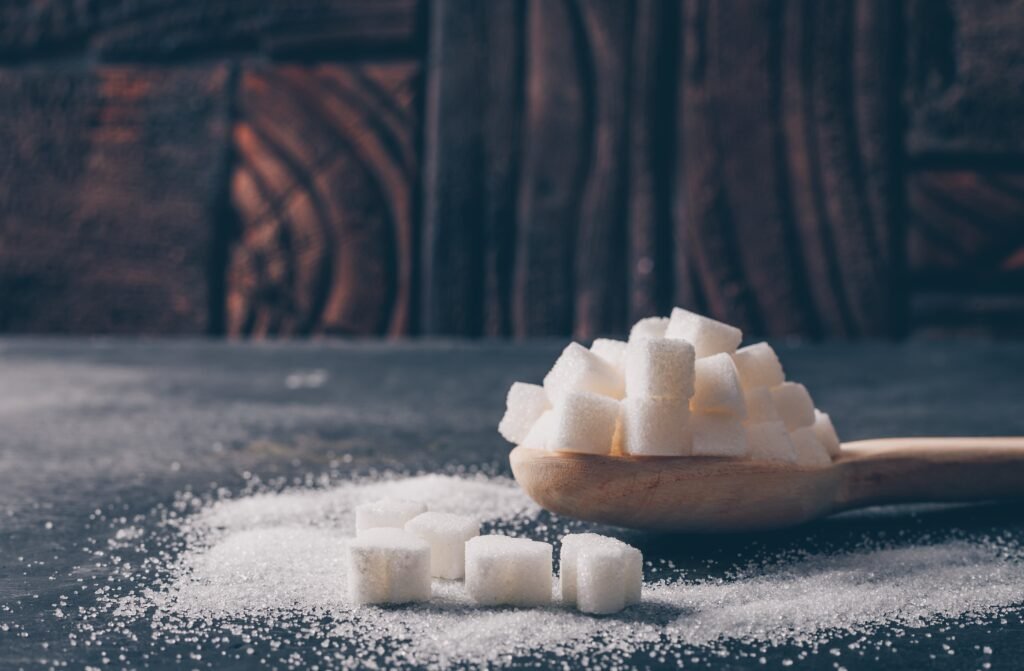Your gut is home to trillions of bacteria that play a critical role in digestion, immunity, mood, and even weight management. This complex community of microorganisms, known as the gut microbiome, thrives when nourished with the right foods. But certain foods can disrupt this balance, leading to bloating, constipation, fatigue, skin problems, and even chronic diseases. Whether you’re from Mumbai or Manhattan, gut health is universal—and the foods that harm it are often surprisingly similar.
In this comprehensive guide, we will explore the 7 worst foods for gut health and offer healthier alternatives, taking into account dietary habits from both Indian and global cuisines. We’ll also dive into scientific research, cultural eating habits, and practical solutions for people of all ages and lifestyles.

Table of Contents

1. Refined Sugar- One of the Worst Foods for Gut Health
Why It’s Bad:
Refined sugar is a primary food source for harmful gut bacteria and yeast such as Candida albicans. Overconsumption can lead to an imbalance, promoting inflammation, leaky gut syndrome, and insulin resistance. According to a study published in the journal Nature, high sugar intake rapidly alters the gut microbial composition and contributes to metabolic disease.
Common Sources:
- Indian sweets (e.g., gulab jamun, jalebi, rasgulla)
- Soft drinks, candies, and packaged desserts
- Breakfast cereals, flavored yogurts, and sweetened beverages like chai with sugar
What to Eat Instead:
- Jaggery (in moderation): A natural sweetener rich in minerals and traditionally used in Indian households
- Stevia or monk fruit: Plant-based, zero-calorie sweeteners that don’t spike blood sugar
- Fresh fruits: Naturally sweet and packed with fiber, antioxidants, and hydration
Additional Tips:
Craving sweets? Try making homemade laddus with dates and nuts, or enjoy a bowl of chilled fruit with a sprinkle of cinnamon.
2. Artificial Sweeteners
Why It’s Bad:
Artificial sweeteners like aspartame, sucralose, and saccharin may seem like a healthy alternative to sugar, but research has shown they can disrupt the gut microbiome and lead to glucose intolerance. A study in Nature (2014) revealed that artificial sweeteners change the composition and function of intestinal bacteria, negatively affecting metabolism.
Common Sources:
- Diet sodas
- Sugar-free chewing gum
- Packaged snacks labeled “sugar-free” or “low-calorie”
What to Eat Instead:
- Raw honey: Contains natural enzymes and beneficial microbes
- Dates and figs: Excellent sweeteners in baking and desserts
- Coconut sugar: Has a lower glycemic index and a caramel-like flavor
3. Fried Foods

Why It’s Bad:
Deep-fried foods are often cooked in refined oils that degrade at high temperatures, forming trans fats and free radicals. These substances inflame the gut lining and reduce the diversity of beneficial bacteria.
Common Sources:
- Indian snacks like pakoras, samosas, puris, and bhaturas
- French fries, onion rings, and fried chicken
- Fast foods and instant noodles
What to Eat Instead:
- Air-fried or baked versions of traditional snacks
- Steamed dhokla, idly, or poha with vegetables
- Grilled or sautéed dishes with olive oil, mustard oil, or ghee in moderation
Healthier Alternatives:
Try oven-baking your samosas or using a paniyaram pan for low-oil versions of fritters. Replace store-bought chips with roasted makhana (fox nuts) or chana.
4. Gluten (for some individuals)
Why It’s Bad:
Gluten is a protein found in wheat, barley, and rye. For individuals with celiac disease or gluten sensitivity, it can damage the gut lining, cause inflammation, and trigger digestive symptoms like bloating and cramps.
Common Sources:
- Bread, pasta, cookies
- Maida-based Indian rotis, naan, and bakery products
- Fast food items with wheat coatings
What to Eat Instead:
- Gluten-free grains: Brown rice, quinoa, millets (ragi, bajra, jowar), amaranth
- Besan (gram flour) chilla or cheela
- Homemade rotis using buckwheat, rice flour, or sorghum flour
Practical Tips:
Experiment with multigrain flour blends and add psyllium husk to your gluten-free doughs for better texture.
5. Processed Meats
Why It’s Bad:
Processed meats like sausages, salami, and hot dogs are loaded with preservatives, sodium, and nitrates, which disturb the gut flora and increase the risk of colorectal cancer. The World Health Organization classifies processed meat as a Group 1 carcinogen.
Common Sources:
- Sausages, hot dogs, bacon, ham
- Frozen meat dishes
- Packaged chicken nuggets and kebabs
What to Eat Instead:
Home-cooked meat dishes: With Indian spices like turmeric, ginger, and garlic that support digestion
Fresh, lean meats: Grilled chicken, fish, turkey, or eggs
Plant-based proteins: Lentils, beans, paneer, tofu, tempeh
Home-cooked meat dishes: With Indian spices like turmeric, ginger, and garlic that support digestion
6. Dairy (for lactose-intolerant individuals)
Why It’s Bad:
Lactose intolerance is common in many Asian populations, including over 60% of Indians. Dairy can lead to bloating, gas, diarrhea, and inflammation in these individuals.
Common Sources:
- Milk, butter, cream, cheese
- Ice cream, kheer, creamy curries
- Buttermilk (for some)
What to Eat Instead:
Fermented dairy: Yogurt (curd/dahi) and kefir are probiotic-rich and easier to digest
Lactose-free dairy products: Lactose-free milk, yogurt, and cheese
Plant-based milk: Almond, soy, oat, coconut
7. Alcohol

Why It’s Bad:
Alcohol consumption, especially in excess, impairs digestion, weakens the gut lining, and kills beneficial bacteria. It also affects liver function and leads to increased gut permeability—a condition known as leaky gut.
Common Sources:
- Beer, wine, whisky, vodka
- Cocktails with sugary mixers
What to Drink Instead:
- Kombucha: Fermented tea loaded with probiotics
- Herbal teas: Peppermint, fennel, chamomile, or ginger tea
- Buttermilk (chaas): A traditional Indian digestive drink, rich in probiotics (for those who can tolerate dairy)
Health Tip:
Limit alcohol to occasional consumption, and always hydrate with water and electrolyte-rich drinks after.
How to Heal and Nourish Your Gut Naturally
Healing your gut doesn’t require expensive supplements or extreme diets. Small, consistent changes in your everyday meals and habits can bring long-lasting results. Here’s a practical and holistic approach to nourish your digestive system and boost your gut health naturally:
1. Eat More Fermented Foods
Fermented foods are natural probiotics that introduce beneficial bacteria into your gut.Fermented foods are rich in live cultures (probiotics) that replenish your gut with good bacteria. These foods help break down nutrients more efficiently and keep harmful microbes in check.
- Global options: Kimchi, sauerkraut, miso, kefir
- Indian options: Idli, dosa, kanji, fermented pickles, homemade curd
2. Add Prebiotics to Your Diet
Prebiotics are the fiber that fuels your good gut bacteria, helping them grow and thrive. Unlike probiotics, which are live bacteria, prebiotics are indigestible fibers that support a balanced gut ecosystem.
- Natural prebiotics include: Garlic, onions, leeks, bananas (especially slightly underripe), oats, asparagus, chicory root
- Bonus: Cooked and cooled rice or potatoes develop resistant starch—a gut-friendly fiber that’s especially good for feeding beneficial microbes.
Try this: Make a smoothie with banana, oats, and a spoonful of flaxseeds for a powerful prebiotic punch.
3. Stay Hydrated
Water plays a critical role in gut health. It helps move waste through your digestive tract and keeps your mucosal lining healthy, which is essential for proper nutrient absorption and microbial balance.
- Aim for 2 to 3 liters of water daily, depending on your climate and activity level.
- Coconut water, infused water (with mint or lemon), and herbal teas are also excellent choices.
Hydration hack: Start your day with warm water and lemon or a pinch of Himalayan salt to wake up your digestion.
4. Practice Mindful Eating
Eating isn’t just about what’s on your plate—it’s also about how you eat. Being mindful during meals improves digestion and reduces bloating.
- Sit down while eating and chew each bite slowly and thoroughly.
- Avoid screens and multitasking during meals.
- Eat at regular intervals to maintain a healthy gut rhythm.
Bonus tip: Try saying a short gratitude mantra before meals—it helps shift your body into a relaxed, digestion-ready state.
5. Exercise Regularly
Physical activity stimulates the muscles of your digestive system and promotes the growth of diverse gut bacteria.
- Daily walk: A brisk 20-minute walk, especially after meals, aids digestion.
- Yoga for digestion: Try poses like Pawanmuktasana (wind-relieving pose), Trikonasana (triangle pose), and gentle twists to massage your internal organs.
- Other options: Dance, cycling, swimming, or even gardening—anything that gets you moving!
Consistency is key. Even low-impact activity, done regularly, makes a big difference.
6. Manage Stress
Your gut and brain are deeply connected via the gut-brain axis. High stress levels can alter your gut bacteria, reduce immunity, and increase inflammation.
- Practice deep breathing, meditation, or yoga for 10–15 minutes daily.
- Journaling, listening to calming music, or spending time in nature can lower cortisol and soothe your gut.
Try this: The “4-7-8” breathing technique—inhale for 4 seconds, hold for 7, exhale for 8—before meals to calm your nervous system.
7. Sleep Well
Sleep affects everything from your mood to your metabolism—and your microbiome is no exception. Poor sleep can reduce microbial diversity and impair digestion.
- Aim for 7–9 hours of restful sleep each night.
- Avoid heavy meals, caffeine, and screen time 1–2 hours before bed.
- Stick to a consistent sleep schedule—even on weekends.
Wind-down tip: A warm cup of chamomile tea or turmeric milk (golden milk) can help you relax and prep your gut for overnight repair.
Conclusion
Your gut is the foundation of your overall health. What you eat directly influences the diversity and balance of your gut microbiota. By avoiding the seven worst offenders—refined sugar, artificial sweeteners, fried foods, gluten (if sensitive), processed meats, problematic dairy, and alcohol—you can dramatically improve your digestive health.
The key is balance. A gut-friendly diet doesn’t mean giving up your favorite foods forever—it means making smarter choices more often. Whether you’re making rajma chawal in Delhi or enjoying a quinoa bowl in California, these gut-friendly alternatives can pave the way for better energy, mood, immunity, and long-term well-being.
Start small. Swap refined sugar for honey, or replace fried snacks with baked ones. Your gut—and your entire body—will thank you.
Frequently Asked Questions (FAQs)
1. How do I know if my gut health is poor?
Common signs include bloating, gas, constipation, fatigue, mood swings, and skin issues. Frequent sugar cravings and food intolerances can also indicate an imbalanced gut.
2. Are all dairy products bad for gut health?
Not necessarily. Fermented dairy like curd or kefir can support gut health, especially if you’re not lactose intolerant. People with sensitivity may prefer plant-based options.
3. Can I improve gut health without supplements?
Yes! Fermented foods, prebiotics, regular exercise, hydration, and sleep can naturally support gut healing without the need for supplements.
4. Are gluten-free diets necessary for everyone?
No. Gluten is only problematic for people with celiac disease or gluten sensitivity. Whole wheat is fine for many unless digestive symptoms suggest otherwise.
5. How long does it take to improve gut health?
Gut health can begin to improve within a few days to weeks of consistent changes. Everyone is different, but most people notice better digestion and energy within 2–4 weeks.
6. Is kombucha good for Indian gut health?
Yes, kombucha is a probiotic-rich drink that’s beneficial globally. But Indian options like kanji, chaas, and curd are just as effective and culturally familiar.
